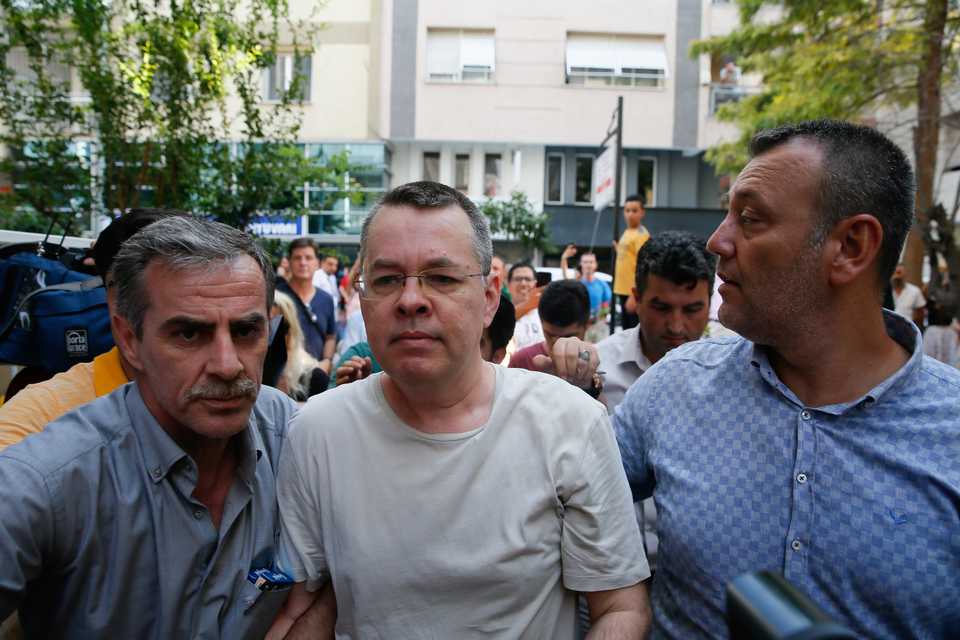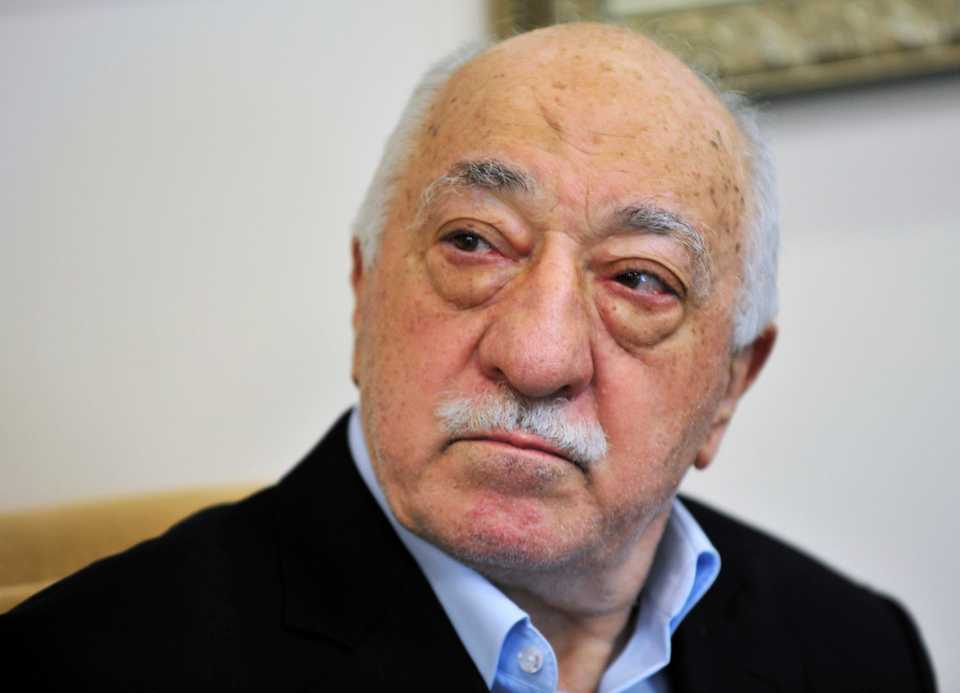The United States on Wednesday imposed sanctions on Turkey’s interior and justice ministers, aimed at pressuring its NATO ally into releasing a detained American pastor who is being tried on espionage and terror-related charges.
Turkey vowed to retaliate against the sanctions, while the two ministers rejected Washington’s move.
Interior Minister Suleyman Soylu tweeted on Thursday that Fetullah Gulen, the cleric and businessman who masterminded the deadly 2016 failed coup attempt, “is our only property” in the United States.
Soylu said, “We will not leave him there. We will take him!”
Amerika’da bir malımız var; Fetö.
Onu da orada bırakmayız,
Alacağız!
— Süleyman Soylu (@suleymansoylu) August 2, 2018
Turkey’s Justice Minister Abdulhamit Gul also tweeted, “I don’t have any other dream but to live and die in this country [Turkey]. I do not even have a single cent in the US or any country other than Turkey. All being well, maybe one day I will have an olive grove in my hometown, Gaziantep.”
Benim bu topraklarda yaşamak ve bu topraklarda ölmek dışında bir düşüm olmadı. ABD’de veya Türkiye dışında herhangi bir ülkede ne bir dikili ağacım, ne bir tek kuruş param da yoktur. Nasip olursa belki bir gün memleketim Gaziantep’te küçük bir zeytinlik alırım.
— Abdulhamit Gül (@abdulhamitgul) August 1, 2018
Washington said the two ministers were responsible for pastor Andrew Brunson’s arrest. While Brunson was detained in December 9, 2016, Abdulhamit Gul became justice minister in July 29, 2017.
Brunson has been under house arrest in the Turkish city of Izmir on terror-related charges.

‘No to US threats’
In a joint statement issued from the Turkish parliament in Ankara, four out of five political parties protested about the US sanctions on the two ministers “in the strongest way” on Tuesday.
“We say ‘no’ to the US threats with common solidarity and determination of our nation,” said the statement issued by the Justice and Development (AK) Party, the main opposition Republican People’s Party (CHP), the Nationalist Movement Party (MHP) and the Good (Iyi) Party.
The written statement added that it was the right of the executive body, or presidency, to give the necessary response to the US based on the principle of international reciprocity.
The HDP, which Ankara says is the political branch of the PKK terror organisation, didn’t endorse the statement.
Türkiye Büyük Millet Meclisinde grubu bulunan 4 siyasi parti, Amerika Birleşik Devletleri Hazine Bakanlığının yaptırım kararına ilişkin ortak açıklama yaptı. pic.twitter.com/v5pd4kWC46
— TBMM (@TBMMresmi) August 2, 2018
While many Turkish Twitter users also slammed the US move with the hashtag #ABDyeBoyunEğmeyeceğiz or #WewillnotbowdowntoUS, an HDP lawmaker welcomed Washington’s sanctions on the country’s officials.
AK Party Group Deputy Chairman Bulent Turan told TRT World, “The US decision, which targets our ministers, is against international law, morality and diplomacy. Our stance on this issue was jointly expressed by the parliament’s four political parties. However, the exclusion of HDP, which did not endorse our statements against previous terrorist attacks, did not surprise us again.”
“We all aware of the US support for the PKK, especially its Syrian branch. The HDP has apparently shown such behaviour due to its brother PKK’s debt to Washington. This attitude has once again proved that the HDP, is not in line with the conscience of our society in national matters.”
‘An equivalent response will be given’
Treasury and Finance Minister Berat Albayrak on Thursday called the US sanctions “unacceptable.”
“Turkey’s priority is to resolve the US sanctions issue through diplomacy and constructive efforts appropriate for two countries and allies with a strong historical background,” Albayrak said in a statement.
Turkish Foreign Ministry called on the US administration to reverse its “wrong decision” late on Wednesday.
“An equivalent response to this aggressive attitude will be given without delay,” the ministry said.
Press Release Regarding the US Treasury Department’s decision to sanction our country https://t.co/kdPlKf9hXK
— Turkish MFA (@MFATurkey) August 1, 2018
Trump vs the world
Onur Erim, a political analyst and author told TRT World, “President Donald Trump is just not on bad terms with Turkey. He has problems with almost every major country in the world. As a matter of fact, he has got more problems domestically.”
“There is big midterm elections coming up in November. We … think that Trump is only making these unbelievable moves … towards us, but no. He is doing this to the entire world.”
“He is on bad terms with China, Germany, probably on the worst terms with the UK and with the rest of world. And forget about what is going domestically.”
“I think he is trying to avoid a really really bad turnout in the November elections and losing the majority in Congress … On the other hand, he is also trying to avoid personal problems by creating pseudo problems.”
Evangelicals’ effect on the White House
Andrew Craig Brunson, an evangelical pastor from Black Mountain, North Carolina, was the head of the Dirilis (Resurrection) church in Izmir.
He was arrested in 2016 on charges of espionage, and for his links to the PKK terror organisation and FETO (Fetullah Terror Organisation).
FETO is responsible for the July 15, 2016 failed coup attempt.
One out of every four US citizens identifies himself as an evangelical Christian, making it the single largest religious group in the country.
Much of their power comes from the fact that they vote as one bloc and in relatively high numbers.
They are one of the core supporters of the Trump administration and have reportedly pushed the White House to act on the Brunson case.
US Vice President Mike Pence and US Secretary of State Mike Pompeo, who are staunch evangelical Christians in the Trump administration, have repeatedly called on Turkey to free the pastor.
What does the indictment say?
Brunson has worked in Turkey for more than 20 years. He was transferred to house arrest on Wednesday due to his health problems.
The court barred him from “abandonment of residence” and also imposed a ban on him leaving the country.
The court rejected his appeal for release in a July 18 hearing. He is scheduled to appear for another hearing in October this year.
The public prosecutors are arguing that Brunson should serve a 35-year sentence: 15 years for committing crimes on behalf of terrorist organisations as a non-member, and up to 20 years for political or military espionage.
The indictment prepared by the Public Prosecutor’s Office in Izmir followed an investigation that took more than a year. It was accepted by the 2nd High Penal Court in the province in April.
Brunson allegedly had information about a possible coup attempt before the FETO-led coup occurred in July 2016 as one of his mobile phone messages to a US soldier showed his support for the coup plotters, the indictment said.
According to the indictment, Brunson wrote, “We were waiting for some events to shake the Turks … the coup attempt was a shock, many Turks trusted the military as they did in the past … We will eventually win.”
The content of the message unveiled that he was “sad” about the defeat of the July 15 coup bid, the indictment added.
In the indictment, Brunson was also mentioned as getting in touch with FETO’s high-ranking members using their alias.
He was accused of determining his strategies by getting in touch with FETO fugitives Bekir Baz, his assistant Murat Safa and Amnesty International’s Turkey branch head Taner Kilic, who is awaiting trial for “being a member of an armed terrorist group.”
In the technical investigation, 293 close GSM signals were detected from Brunson with fugitive Bekir Baz.
A secret witness, code named, Dua, told prosecutors that the PKK members who were released from prison fled the country with the help of churches being run under the supervision of Brunson.
The pastor, who has been living in Turkey for over two decades, has denied the charges in the indictment.
“Turkey is an independent and secular state. We have always respected other religions as rule of law prevails in our country. We respect the US constitution, similarly, they have to respect ours,” Mesut Hakki Casin, a professor and head of the International Relations department at Istinye University told TRT World.
“The US president is telling Turkey to make an unlawful decision and go against its judicial system.”
Why have relations between the two soured?
Brunson is not the one and only reason for strained ties between Ankara and Washington recently.
The two NATO allies have come up against various issues, including the extradition of Fetullah Gulen from the US to Turkey, US armed support to the YPG – the Syrian branch of the PKK terror organisation – and the arrest of a Turkish banker.
And the Trump administration’s threats to Turkey seem to sacrifice rule of law for the release of American pastor while it claims that it cannot interfere in the judiciary process of Turkish nationals in the US, whom Turkey wanted to send back.
Fetullah Gulen orchestrated the defeated coup of July 15, 2016 in which officials say 251 people died and over 2,600 were injured.
Turkey has sought Gulen’s extradition from the US, where he has been residing in an exclusive compound in Pennsylvania for the last few decades.
Washington insists that it needs evidence to extradite Gulen. But Ankara says it has provided enough evidence of his involvement.
“Turkey has provided numerous evidence to the American institutions on the involvement of Fetullah Gulen to the coup attempt. Washington has to reconsider its position against the FETO,” Casin said.

‘Mistakes on top of mistakes’
Washington is also supporting the Syrian branch of the PKK, which is recognised as a terrorist organisation by Turkey, the US and the EU.
The group has been waging an armed campaign against the Turkish state for more than three decades and the fighting has left more than 40,000 dead, including civilians.
The YPG had declared its desire for an autonomous region in northern Syria.
However, the US has decided to work with the group on the ground against Daesh in Syria despite Ankara’s strong objections.
US officials arrested Hakan Atilla, a Turkish banker at Turkey’s Halkbank, in 2016, and sentenced him in May to 32 months in an American prison for plotting to help Iran evade US sanctions.
“The US administration has been making mistakes on top of mistakes in their foreign policy, in their foreign relationships … putting at risk this good relationship [that has] developed over the years between the US and Turkey,” Sinem Vatanartiran, president of Istanbul’s Bahcesehir University told TRT World.










Discussion about this post